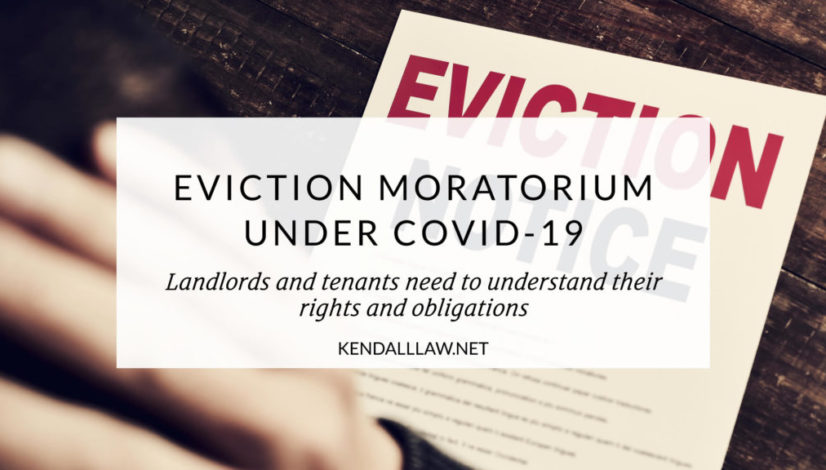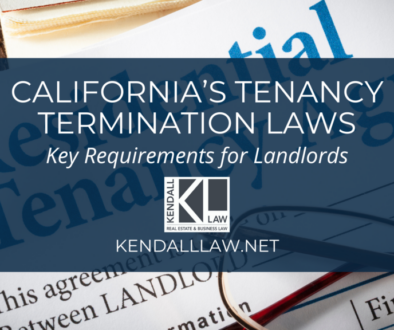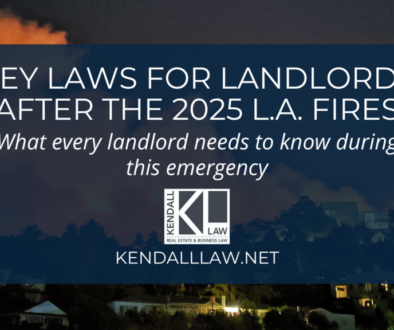Eviction moratorium under COVID-19: Landlords and tenants need to understand their rights and obligations
The speed at which the coronavirus is spreading has caused the state and federal government to take drastic measures. It is projected that nearly 56% of California’s population, roughly 25.5 million people, will be infected by the virus over an 8-week period.
As a result, on March 18, Governor Gavin Newsom ordered California’s nearly 40 million residents to stay home as much as possible and required the closure of all “non-essential” businesses. Although these steps will hopefully halt the spread of the pandemic, it has caused economic devastation for those who have lost jobs and hours at work.
To soften the blow, Governor Newsom issued an executive order that authorized local governments to halt evictions for residential renters and homeowners. This Executive Order became effective just as Californians are experiencing significant lay-offs or reductions in pay, impacting their ability to keep up with their rents and mortgages. The order does not relieve a tenant of his or her obligation to pay rent or curtail a landlord’s right to collect rent that is due. The protections are in place until May 31, 2020.
Furthermore, with the mandatory closure of restaurants, bars, nightclubs, gyms, movie theaters and other entertainment-type venues, it has become exceedingly difficult for retail and office tenants to satisfy their rent obligations. As a result, landlords should take certain steps to proactively protect their investments. Landlords should review the terms of their lease agreements to ensure that they fully understand their own rights and obligations during this time. Landlords must be realistic in understanding that our current state of affairs is not “business as usual” and that their rights under their leases may be limited by law or social pressure. For instance, many commercial tenants throughout the state are asking their landlords for leniency. The ramifications of business closures on California’s economy, which is heavily dependent on the entertainment and hospitality industries, could have a domino effect on other commercial and residential real estate property.
It is highly advisable for landlords to work with their tenants to devise creative solutions that would enable tenants to maintain operations while simultaneously allowing landlords to meet their own loan obligations. Landlords may wish to consider entering into a partial rent abatement agreement with their tenants. The agreement should contain defined reinstatement dates and a repayment schedule. Tenants will be impacted by this pandemic regardless of their landlord’s actions, however, a landlord’s willingness to evaluate alternate pay structures may be beneficial in the long term. That said, landlords must first review their own loan documents to ensure that they are knowledgeable about how the requirements of those loans affect their investments.
The question lingering in everyone’s mind is whether the federal government will step in and stop evictions as it did with single-family homes. (Under the Department of Housing and Urban Development’s Plan released on March 18, foreclosures and evictions would stop for 60 days on single-family homes with loans through the Federal Housing Administration). The consequences of paying rent on a location that is not in business would be a substantial blow to retailers. Rent is typically their major expense. Tenants are hopeful that their landlords will work with them on rent abatements or rent deferrals. The looming unanswered question for all is, “How long will this last?”
There is no doubt that the widespread coronavirus-related business lockdowns present an unprecedented challenge. It is highly likely that many businesses will not be able to pay their rent in full. With tenants not meeting their rent obligations, landlords may struggle to meet their own loan obligations. Even if a landlord evicts a tenant, it would be exceedingly difficult for a landlord to find a replacement tenant. The landlord’s dilemma remains how to satisfy the lender. Commercial landlords and their tenants need a comprehensive solution: one that allows the tenant to stay in business while simultaneously assisting landlords with their own loan obligations.
Local jurisdictions and municipalities are adding their own emergency ordinances similar to that of the Executive Order. Since this article was written the Executive Order has been modified. Los Angeles rent control districts have also enacted ordinances to ban rent increases. To get updated information please contact us.
In these quickly changing times, it is imperative that commercial and residential landlords and tenants understand their rights and obligations. Eileen Kendall has represented real estate clients in California for over 15 years. For your consultation contact Ms. Kendall of Kendall Law at (310) 619-4941.
Author: Eileen Kendall





